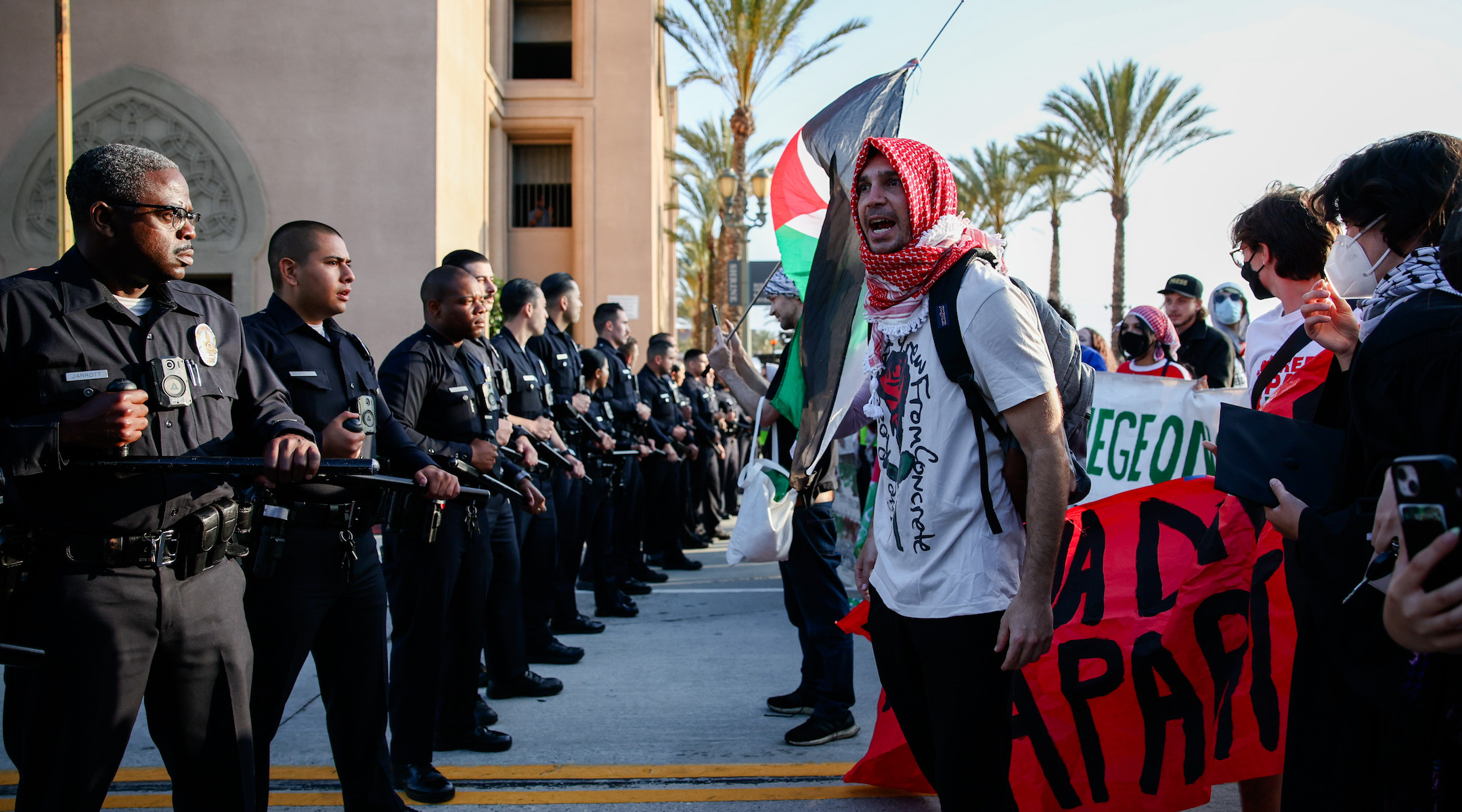In a rarity, Cornell pro-Palestinian encampment disbands with neither arrests nor deal
Students with the pro-Palestinian protests said they were continuing to negotiate with the university

Cornell University buildings viewed from McGraw Tower. Photo by Getty Images
(JTA) – The student encampment at Cornell University is disbanding, in a rare instance of a campus pro-Palestinian protest dissolving on its own.
Encampments at a series of other schools have ended only after schools made agreements with protesters or called in police. Police action has led to thousands of arrests, chaotic scenes of violence and accusations of suppressing free speech. Agreements with protesters have incurred the wrath of many in the organized Jewish community, who argue that the encampments should face consequences for encouraging antisemitic behavior.
On Tuesday, Cornell University’s protesters presented a third option, taking down their tents voluntarily, well in advance of the school’s May 25 commencement and days after the school’s president, Martha Pollack, announced her impending retirement.
No deals were struck. No arrests were made. The students simply left of their own accord.
“Our Liberated Zone is closing, but the fight continues,” Cornell’s chapter of Students for Justice in Palestine announced on Instagram Monday. The post did not elaborate on the decision, but a participant said that the protesters wanted to end their demonstration on their own terms.
“It’s coming down because we wanted to take this into our control,” Sivan Gordon-Buxbaum, a Jewish graduate student at Cornell who is a member of the anti-Zionist Jewish Voice for Peace, told WENY, a local station.
“We are making the choices, and we don’t want to be at the whim of the administration,” Gordon-Buxbaum added. “So this is us being like, this is our choice. We’re taking this down. It will give us an opportunity to regroup, refocus, restructure, potentially in preparation for next fall.”
The encampment’s conclusion also comes as Cornell’s campus is emptying out. Classes ended a week ago, and students are now in the midst of final exams, which will end next week. In recent days, several other encampments have also ended more peacefully. Those steps have usually come after a deal with university administrators to explore divestment from Israel and, in some cases, guarantee amnesty for protest leaders.
That was the case Tuesday morning at fellow Ivy League school Harvard University, where the encampment was dismantled after the school’s interim president, Alan Garber, agreed to have Harvard’s board discuss divestment with protesters, according to the Harvard Crimson. Garber, who is Jewish, stepped into the role after Claudine Gay resigned amid fallout from a December congressional hearing focused about pro-Palestinian activism on the campus.
On May 3, the encampment at Tufts University also ended without a deal, after the administration threatened charges and organizers accused the school of acting in bad faith. Other encampments, including at the University of Southern California, were dismantled after organizers compiled with orders to leave. In USC’s case, nearly 100 protesters had been arrested during an earlier skirmish with police.

Pro-Palestinian supporters confront police and rally outside the Shrine Auditorium and Expo Hall during the Commencement Ceremony of Pomona College on Sunday, May 12, 2024 in Los Angeles, CA. Pomona College had made the decision to move its commencement ceremony to the Shrine Auditorium and Expo Hall after pro-Palestinian protesters set up an encampment this week on the ceremony stage. (Jason Armond / Los Angeles Times via Getty Images)
Cornell’s encampment said it was still negotiating with the administration, regardless of Pollack’s resignation. Its demands include divestment; the end of a partnership between Cornell and the Technion Israel Institute of Technology; a call for a ceasefire in Gaza; the establishment of a Palestinian studies department; and a statement from the university that anti-Zionism is not antisemitism. It also demanded amnesty for protesters and “restitution,” including “surplus land,” to Indigenous tribes in the area.
“While administration has tried to slow down negotiations, the pace is beginning to pick up,” the Instagram post said. Even absent a deal, Cornell protesters declared their action a success. They said they had received “generous fiscal donations from the community,” and planned to donate much of it “to charities supporting Palestinians in Gaza.”
Active for 18 days, the Cornell encampment had largely avoided the viral moments of unrest and allegations of antisemitism that have plagued other campus encampments. Cornell had drawn widespread attention early in the war when a student sent death and rape threats to his Jewish peers and a professor said at a rally that he was “exhilarated” by Hamas’ Oct. 7 attack.
A handful of encampment protesters at the school had been suspended, but a Jewish professor on campus told the Jewish Telegraphic Agency that the group’s activities had been mostly peaceful.
“On the whole it was a textbook example of non-violent civil disobedience on the demonstrators’ part,” said Menachem Rosensaft, an adjunct law professor currently teaching a course on antisemitism and the law. Rosensaft is also the former general counsel of the World Jewish Congress.
In the weeks since the encampments went up, elected officials and major Jewish groups have put pressure on universities to clear the tent protests out before the semester ends. Pressure from critics on Columbia University to dismantle its own encampment last month — the first in the nation — led to the school applying force to its protesters, which in turn prompted fierce pushback nationwide. Earlier this month, Columbia canceled its own commencement.
Some encampments have been replaced by more confrontational protests. An encampment Pomona College students set up last week at the California school’s planned commencement site was abandoned after the school moved its commencement to USC’s campus instead. A group of more than 100 protesters stormed the ceremony’s new location, leading to a confrontation with police and at least one arrest.
But Rosensaft theorized that the Cornell protesters, unlike some others, were starting to wake up to the limits of their activism on campus.
“I am quite certain that the students in the encampment felt that they had made whatever point they were going to make, and that were unlikely to have any further impact,” he said. “I can only assume that they realized that the administration was not going to give them additional oxygen by raising the temperature with confrontational action — and the vast majority of students and faculty were simply not prepared to support them.”
This article originally appeared on JTA.org.













